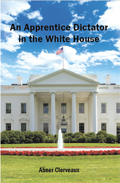
 |
Political superstar John Red Light is young, handsome, and charismatic. When he wins the American presidential election, his inauguration is attended by the most prestigious leaders of the world, including the Pope and the Queen of England. Unfortunately, he is also a womanizer. Once he gains control of the White House, he becomes obsessed with a new lover and, though married, spends time with her inside the Oval Office, giving the opposition party ammunition for impeachment. The President, however, reacts to these threats by extending his presidential powers and forming a dictatorship, rendering the judicial and legislative branches impotent. As tension builds, the government and its citizens are forced to answer a crucial question: “What kind of country will we be?”
In the book’s preamble, Clerveaux states his novel is a “fictional paradox” and lays out the premise as this cautionary tale of an American president who neither possesses nor follows the high moral standards set forth by his predecessors and precedence. Elected leaders are chosen to serve the people, but the new president serves only his own uncontrollable lust, which makes him unfit to hold the office. He is blind to the harm he is causing the country through his moral failings, and his desire to keep those failings from the public results in a grab for absolute power. However, in America, democratic institutions are strong, and people believe in the tenants of democracy. making any attempt to form a dictatorship one which is bound to meet opposition.
Clerveaux grew up in Haiti under a dictatorship, a background which gives him a unique political point of view. He was active in politics in Haiti before he came to America at twenty-one and has been a political radio commentator for over 30 years. Though the novel contains obvious parallels to the state of the government in America today, in a 2018 interview with Kate DeLaney, he reveals his inspiration for writing the book was the impeachment of President Bill Clinton. The use of “apprentice” in the title, the author explains, refers to a “want-to-be” dictator, not to any one person. Wanting to show Americans how lucky they are to live in a country with strong institutions in place, making the rise of tyranny impossible, he believes the book to be appropriate for all ages.
Clerveaux’s tale of a morally bankrupt leader paints a bleak and devastating picture. Though it was written over the course of several years and published before the 2016 election, it’s hard not to imagine it as a commentary on today’s government. Perhaps that’s the point. The rise of tyranny is devastating, and the biggest thing this book does is remind the reader of the brilliance of the American Constitution and the nation’s government. Though there are certainly things today which go against the norms in the government, the institutions of democracy are strong. His fictional paradox exposes the ideal set against the base nature of mankind.
The highest elected office has frequently been deemed as venerable but is now viewed by some as corrupt and shameful. It is the age-old story of the corrupt nature of power. American idealism calls for leaders who are pure of heart, who set high standards, and who work for the good of the people. It is an ideal which is taught in school from kindergarten through high school, yet one which seems to seldom find its way into the halls of government. However, even with all its faults, we still strive for perfection, checking and balancing each part of the government in an attempt to reach truth, fairness, and the common good. This book is a reminder that America’s government may still be the best the world has to offer.